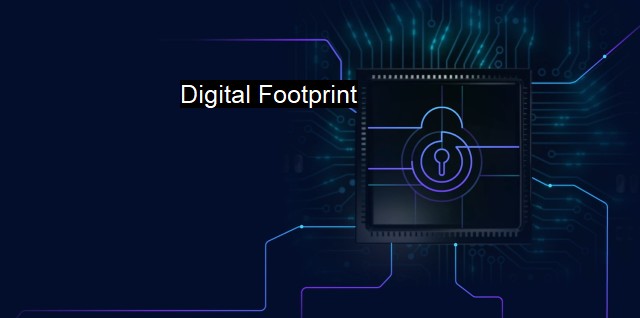What is Digital Footprint?
Why Protecting Your Digital Footprint Is More Vital than Ever: Exploring the Risks, Methods, and Benefits of Using Cyber Security Solutions
A "digital footprint" refers to the unique trail of data created while using the Internet. It encompasses everything, from the websites you visited, your social media activity, and information on online forms to the emails you sent, videos you watched, and even the location data of your devices. Any online activity leaves behind a digital fingerprint, effectively representing information that can be traced back to you.Understanding your digital footprint is crucial. It is essentially a hacker's treasure trove, containing invaluable amount of information about you that can potentially be exploited by people with malicious intent. Both individuals and organizations have digital footprints that stretch across social networks, blogs, photo sharing sites, online forums, and email exchanges.
The cornerstone of any successful cybersecurity strategy is knowledge and awareness of your digital footprint. Internet users should understand that each online interaction leaves traceable data that can be exploited, temporarily or indefinitely stored. The larger your digital footprint, the more you're exposing yourself to potential attacks. a smaller footprint corresponds to minimized risk.
Every message sent, every transaction made, every image or video uploaded and even your participation in online forums, are all digital footprints which can be leveraged by cyber criminals to gain access to personal details, financial data, intellectual property and proprietary data. By understanding the basis of how digital traces can enable targeted attacks, we can implement more deliberate and informed strategies to secure our digital presence.
Antivirus software plays an important role in protecting your digital footprint. The software shields your system from malicious viruses, spyware, ransomware, malware and other forms of cyber threats. Targets of these threats often result in the unwanted dispersal of personal information, a clear violation of privacy which can lead back to the individual's digital footprint.
Cybersecurity measures, including antivirus programs, are important mechanisms for individuals and businesses to protect their digital interactions. These solutions focus on detecting and eliminating threats before they infiltrate the system, as well as encrypting data to render it unreadable to hackers. Without these safeguards, the sensitive information within our digital footprint is left exposed to be exploited by cyber criminals.
The breadth of information accessible within the digital footprints of corporations emphasizes the gravity of possible threats. Businesses harbor data including confidential customer details, staff information, trade secrets, and strategic plans. A comprehensive cybersecurity strategy considers this expansive digital footprint in identifying potential vulnerabilities, securing them and establishing protective firewall measures.
a digital footprint is the trail of data that one leaves behind while browsing the internet or using online services. It contains sensitive information that, when in the wrong hands, can lead to harmful exploits. Understanding and controlling this digital footprint is essential in mitigating these risks and maintaining a strong online presence. Antivirus and cybersecurity protections offer added layers of security, safeguarding against threats aiming to exploit these digital footprints and further proving their crucial role in today’s digital world.

Digital Footprint FAQs
What is a digital footprint?
A digital footprint refers to all the digital information that an individual shares, leaves behind or creates online. This includes any personal information such as names, email addresses, phone numbers, login credentials, search histories, social media activities and much more.Can a digital footprint cause a cybersecurity breach?
Yes, a digital footprint can lead to cybersecurity threats and breaches. Cybercriminals can use the information shared or left behind online to carry out identity theft, phishing scams, social engineering attacks and other forms of cybercrime.How do antivirus programs help protect against threats from digital footprints?
Antivirus programs are essential cybersecurity tools that help detect and remove malware, spyware and other types of malicious software that cybercriminals use to infiltrate devices and networks. By scanning for and identifying threats within an individual's digital footprint, antivirus programs can provide protection against these risks.Are there any steps individuals can take to reduce the impact of their digital footprint on cybersecurity?
Yes, there are several measures individuals can take to minimize the impact of their digital footprint on cybersecurity. These measures include regularly updating and strengthening login credentials, limiting the amount of personal information shared online, using security software such as antivirus programs, and being cautious when clicking on links or downloading attachments from unknown sources.| | A | | | B | | | C | | | D | | | E | | | F | | | G | | | H | | | I | | | J | | | K | | | L | | | M | |
| | N | | | O | | | P | | | Q | | | R | | | S | | | T | | | U | | | V | | | W | | | X | | | Y | | | Z | |
| | 1 | | | 2 | | | 3 | | | 4 | | | 7 | | | 8 | | |||||||